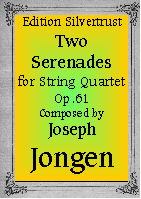Presents
Joseph Jongen
 |
 |
|
Two Serenades for String Quartet, Op.61
Joseph Jongen (1873-1953), on the strength of an amazing precocity for music, entered the Liege Conservatory (in Belgium) at the extraordinarily young age of seven where he spent the next sixteen years. The admission board was not disappointed. Jongen won a First Prize for Fugue in 1891, an honors diploma in piano the next year and another for organ in 1896 . In 1897, he won the prestigious Grande Prix de Rome which allowed him to travel to Italy, Germany and France. He began composing at the age of 13 and immediately exhibited extraordinary talent. By the time he published his opus one, he already had dozens of works to his credit.
During the First World War, Jongen lived in London and composed his Two Serenades for String Quartet in 1918. Each serenade is in three movements which are played without pause. The highly respected chamber music critic Wilhelm Altmann, writing in his Handbook for String Quartet Players, has this to say about the two serenades
"These two serenades are among the finest examples of light music in the absolute best sense of the word. They are full of rich inspiration and wonderful tone colors.
The first, Sérénade tendre, begins with a melancholy theme in the upper voices against the cello pizzicato which creates the sound of a guitar accompaniment. The theme of the second section is closely related to that of the first, but the treatment is edgy and tonally exotic. The third section, closely related to the others, has a mysterious quality to it. The second, Sérénade dramatique, begins with all four voices playing a disjointed pizzicato introduction before the first violin introduces a sad, penetrating melody. Slowly one realizes that this is music of the night. The middle section begins simply with a lovely theme into which Jongen inserts fascinating dissonances that slowly changes the mood. The finale section has a bright tune for its main theme. Quickly it broadens and builds both tension and excitement leading to wonderful coda.
Out of print for many years, these serenades can be performed together as a concert work or separately where a shorter work or impressive encore is required.
Parts: $24.95